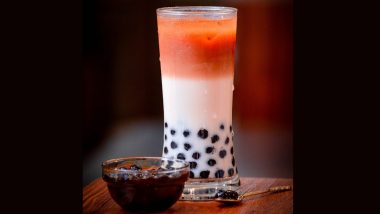Tainan, December 19: One of the most well-liked cold tea drinks is bubble tea, often referred to as boba tea and pearl milk tea. The moniker, which derives from the tapioca pearls' jelly-like texture and gives the drink the impression of bubbles, has become quite popular, particularly among Gen Z and millennials. Still, few would have guessed that consuming too much of it might cause a fatal illness. In one instance, surgeons at the Chi Mei Medical Centre in Tainan, Taiwan, were able to safely remove 300 kidney stones from a lady during surgery. According to reports, the woman drank a lot of bubble tea and chose it over water on a regular basis.
According to the most recent reports in Money Control, Xiao Yu, age 20, was hospitalised following episodes of severe back pain and fever. But the ultrasound revealed the presence of stones, necessitating an urgent surgical procedure. An additional 300 kidney stones, ranging in size from 5 mm to 2 cm, were discovered by the CT scan. A significant increase in Xiao's white blood cell count was also shown by her blood test, indicating the severity of her illness. Around 3,000 Kidney Stones Found In Chinese Woman’s Body After She Complained of Back Pain (View Pic).
Upon examination, the hospital's doctors discovered that 20-year-old Xiao was experiencing fever and back pain as a result of her enlarged kidneys from the stones. After surgery, more than 300 kidney stones—which resembled "small steamed buns"—were removed from her body.
Although around 9.6% of Taiwanese people may experience kidney stones at some point in their lives, the physicians speculated that Xiao's predilection for bubble tea rather than water may have contributed to her illness. As of right now, Xiao's status is stable, the operation is said to have been successful, and she has been released from the hospital. Doctors Remove 156 Stones from 50-Year-Old Man's Kidney in Hyderabad.
The experts also disclosed that a number of variables, including hereditary predisposition, chronic diseases, or diets high in calcium and protein, may have contributed to the development of the stones. Urologist, who also performed the procedure, clarified that stones can be identified when a patient consumes very little or no fluids, which causes urine to become more concentrated and crystallise. He further mentioned that kidney stones are typically detected in individuals between the ages of 50 and 60, despite the fact that males are more than three times as likely as women to get stones.
(The above story first appeared on LatestLY on Dec 19, 2023 11:31 PM IST. For more news and updates on politics, world, sports, entertainment and lifestyle, log on to our website latestly.com).













 Quickly
Quickly




















